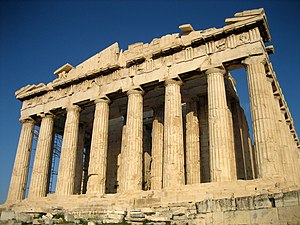
Back Antieke Griekeland Afrikaans Antikes Griechenland ALS Antiga Grecia AN اليونان القديمة Arabic اليونان القديمه ARZ প্ৰাচীন গ্ৰীচ Assamese Antigua Grecia AST НекӀсияб Грекия AV Qədim Yunanıstan Azerbaijani قدیم یونان AZB


Ancient Greek civilization, also commonly called Ancient Greece, was a large area, mostly along the northeast shore of the Mediterranean Sea, where people spoke the Greek language. The area was much larger than today's country of Greece. The Greek civilization thrived from the archaic period of the 8th to the 6th centuries BC to 146 BC. The period ended with the Roman conquest of Greece at the Battle of Corinth.
For most of the time, the Greeks did not have one government or ruler although they had a common language and culture.[2][3] There were many city-states, each with its own constitution. Athens, Sparta and Corinth were powerful city-states. Some had kings, and others, like Athens, had a form of democracy. As time went on, the most powerful city-states collected others into groups known as "leagues". That applied to many of the Greek colonies in Asia Minor, most of which had close ties to one or to another of the three biggest cities.
In the middle of the period, Classical Greece flourished during the 5th to 4th centuries BC. Athenian leadership repelled the threat of Persian invasion during the Greco-Persian Wars. The Athenian Golden Age ended with the defeat of Athens at the hands of Sparta in the Peloponnesian War in 404 BC.
In the last period, Greece was unified by the conquests of Alexander the Great. The city-states continued under the overall influence of Macedonia during the Hellenistic Period.
Greek culture had some influence on the Roman Empire, the main power of the Ancient World. That made classical Greece part of the foundation of Western civilization. Greek was also the language of the Byzantine Empire.[4]
- ↑ Maynard, Christopher (1996). Greek Times (Little Histories). Kingfisher. p. 12. ISBN 0753400707.
- ↑ Christidis, Anastasios-Phoibos, ed. 2007. A history of Ancient Greek: from the beginnings to late antiquity. Cambridge University Press.
- ↑ Easterling P and Handley C. 2001. Greek scripts: an illustrated introduction. London: Society for the Promotion of Hellenic Studies. ISBN 0-902984-17-9
- ↑ Horrocks, Geoffrey. 2010. Greek: a history of the language and its speakers, 2d ed. Oxford: Wiley-Blackwell.